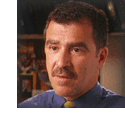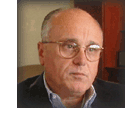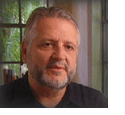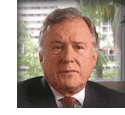



Chairman of the International Relations department at
Florida International University.
The Elián case has been disastrous for the Cuban-American community
on several levels. One, in terms of leadership. There is no leader in sight
now, and everyone is running for cover. Also it has been terrible for the
image of Cuban-Americans. Once perceived as golden exiles, that image is
tarnished because of the media portrayal of a handful of Cuban-Americans, when
in fact there are 700,000 Cuban-Americans in south Florida. It has been very,
very sad and has led to another level of frustration for this
community.




Executive director of the Cuban Committee for Democracy
Maybe the one healthy thing that happened is that the idea that
Cuban-Americans were some sort of privileged class of immigrants. . . . That's
no longer the case. A friend called me three days later to ask, "Why have they
[the U.S. government] done this to us? They don't do this to anybody else."
And I laughed. I said, "Honey, they do it to Mexicans every day and to
Guatemalans every day. Do you know how many times a day in different
communities in this country INS breaks down the door and takes old people,
children, women, and deports them? It happens every single day." ... It just
didn't happen to Cubans before. Join the club. Welcome to the club. Welcome
to the immigration club.




A prominent Cuban American businessman and civic
leader
In the short run, the Elián case has not been good to the Cuban
community. But over the mid-term and the long-term, we will find that it has
had a very positive impact. Again, I want to emphasize, not for
Elián--I think it was very unfortunate for the child. But clearly for
the Cuban community, it has been a watershed event. It has helped the Cuban
community realize that we all need to get involved in the cause for Cuban
freedom and democracy; that we need to reevaluate our strategy; that we need to
reassess what we're doing. We need to explore new alternatives, newer
strategies. We need to do a better job of communicating to the world and to
the people in America why this is important.
And then we need to reach out to our own brothers and sisters on the
island, so that we can reach a process of better understanding and working
together to develop a future for Cuba. In my opinion, we have, for too long,
been focused on the past. We have, for too long, been focusing on the person
of Fidel Castro and quite frankly, Castro and his ideology are not relevant to
Cuba's future. His policies offer no future to young Cubans on the island. It
is a bankrupt ideology.
We need to show the Cuban nation what the future can be like. We need to
show them how we can rebuild a nation that's based on democracy, on free
markets, on social justice, and on brotherhood or sisterhood and what love and
reconciliation can bring to a nation. That is, I think, the important message
for the Cuban people. We can make it happen. Castro is not relevant any more.
Let's focus on the future.




Senior research associate at the North-South Center at the
University of Miami
The defeat of the hard-line forces has isolated them in Miami from other
communities and in the United States, to some degree. However, US policy is
still made in Washington, D.C., and money and political organization still
counts a lot. The Helms-Burton law nailed in very strongly many elements of
that policy. There doesn't seem to be a political will by either of the
presidential candidates to do anything to change Cuban policy. So the game may
have changed somewhat, the momentum may have changed, but we'll still have to
see if the score is going to change.




Chairman of the International Relations department at
Florida International University
Elián was a catalyst for the opposition to the US embargo. It
allowed people who had been waiting to attack the embargo policy to come out in
full force and wage this policy battle in Washington. Elián served as a
lightning rod, and that is why the frustration is running deeper in Cuban
Miami.




Professor at Florida International University,
where he founded the Cuban Research Institute.
I think the most important consequence of the Elián situation has
been a real loss of influence on the part of Cuban-Americans in influencing US
policy. A lot of the US has now, because of Elián, focused a bit on
Cuba and focused on the role that Cuban-Americans have had in formulating US
policy, and may be unwilling in the future to let US policy towards Cuba be
determined by Cuban exiles in Miami. Certainly if you look at editorials of
newspapers around the country, you can see that that's what they're saying:
"Why have we, in effect, let these people in Miami run US-Cuba policy?"
From the beginning, Elián was a no-win situation for Cuban-Americans and
was a win-win situation for Castro. If the child was returned, he could say it
was a victory for the revolution. If the child was not returned, it was yet
another injustice of the Americans and of the Miami Mafia, as he calls them.
So it was always a win-win situation for Castro. But yet, Cuban-Americans
plunged headlong into this and did not think of these consequences.




Former mayor of Miami
The Elián issue has exacerbated the feelings of this [Cuban]
community, not only with the white American community, but also with the black
American community. The relationship between the black community and the
Cuban-American community deteriorated even further because of Elián.
It's a symbol to them that they're being treated differently, that they haven't
had the opportunities in their opinion that the Cuban community has had, that
the immigration laws for Haitians who are black are not the same as for Cubans.
So there is a major resentment.


home · analyses · interviews · timeline · discussion
video excerpt · links · readings · synopsis
tapes & transcripts · press · credits
frontline · wgbh · pbs online
web site copyright WGBH educational foundation
top photo © afp/corbis
 |  |